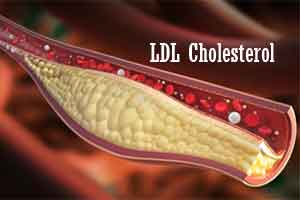- Home
- Editorial
- News
- Practice Guidelines
- Anesthesiology Guidelines
- Cancer Guidelines
- Cardiac Sciences Guidelines
- Critical Care Guidelines
- Dentistry Guidelines
- Dermatology Guidelines
- Diabetes and Endo Guidelines
- Diagnostics Guidelines
- ENT Guidelines
- Featured Practice Guidelines
- Gastroenterology Guidelines
- Geriatrics Guidelines
- Medicine Guidelines
- Nephrology Guidelines
- Neurosciences Guidelines
- Obs and Gynae Guidelines
- Ophthalmology Guidelines
- Orthopaedics Guidelines
- Paediatrics Guidelines
- Psychiatry Guidelines
- Pulmonology Guidelines
- Radiology Guidelines
- Surgery Guidelines
- Urology Guidelines
LDL-C

Following an atherosclerotic ischemic stroke, reducing LDL-C to <70 mg/dl compared to 100±10 mg/dl resulted in a lower risk for more CV events, according to a new study. The study supports the use of intensive medical therapy for patients with a recent stroke or TIA and following an ischemic stroke or TIA, an LDL target of <70 mg/dL should be the goal.
France: A recent study presented at the American Heart Association (AHA) 2019 annual meeting, found that lowering LDL-C (low-density lipoprotein-cholesterol) to <70 mg/dL target compared with a target of 100+10 mg/dL lowers the risk of cardiovascular (CV) events in patients who suffered a recent ischemic stroke with evidence of atherosclerosis. This occurred without an increase in the risk of hemorrhagic stroke or incident diabetes. Findings of the Treat Stroke to Target trial was also subsequently published in the New England Journal of Medicine.
The use of intensive lipid-lowering therapy by means of statin medications is recommended after a transient ischemic attack (TIA) and ischemic stroke of atherosclerotic origin. However, a recommended target level of LDL-C cholesterol is lacking. Pierre Amarenco, Paris University, Paris, France, and colleagues evaluated the reduction in CV events by targeting LDL-C < 70 mg/dl after atherothrombotic ischemic stroke compared to an LDL of 100 ±10 mg/dL.
The trial, involving a total of 2860 patients, was conducted in France and South Korea. The patients had ischemic stroke in the previous 3 months or a TIA. They were randomly assigned in the ratio 1:1 to a target LDL cholesterol level of less than 70 mg per deciliter (1.8 mmol per liter) (lower-target group, n=1430) or to a target range of 90 mg to 110 mg per deciliter (2.3 to 2.8 mmol per liter) (higher-target group, n=1430) and followed for a median of 3.5 years. All the patients had evidence of cerebrovascular or coronary-artery atherosclerosis and received a statin, ezetimibe, or both.
The composite primary end-point of major cardiovascular events included ischemic stroke, myocardial infarction, new symptoms leading to urgent coronary or carotid revascularization, or death from cardiovascular causes.
Read Also: Bempedoic acid enhances LDL-C lowering effect of statins in high risk patients: JAMA
Key findings of the study include:
- The mean LDL cholesterol level at baseline was 135 mg per deciliter (3.5 mmol per liter), and the mean achieved LDL cholesterol level was 65 mg per deciliter (1.7 mmol per liter) in the lower-target group and 96 mg per deciliter (2.5 mmol per liter) in the higher-target group.
- The trial was stopped for administrative reasons after 277 of an anticipated 385 end-point events had occurred.
- The composite primary endpoint occurred in 121 patients (8.5%) in the lower-target group and in 156 (10.9%) in the higher-target group (adjusted hazard ratio, 0.78).
- The incidence of intracranial hemorrhage and newly diagnosed diabetes did not differ significantly between the two groups.
Read Also: Evolocumab significantly reduces LDL-C in ACS patients: JACC
"After an ischemic stroke with evidence of atherosclerosis, a target LDL of less than 70 mg/dL reduced the risk of subsequent cardiovascular events, as compared to a target of 100+10 mg/dL, without increasing the risk of hemorrhagic stroke or incident diabetes," wrote the authors.
The study, "A Comparison of Two LDL Cholesterol Targets after Ischemic Stroke" is also published in the NEJM journal.
Dr Prem Aggarwal, (MD, DNB Medicine, DNB Cardiology) is a Cardiologist by profession and also the Co-founder of Medical Dialogues. He is the Chairman of Sanjeevan Hospital in Central Delhi and also serving as the member of Delhi Medical Council

Disclaimer: This site is primarily intended for healthcare professionals. Any content/information on this website does not replace the advice of medical and/or health professionals and should not be construed as medical/diagnostic advice/endorsement or prescription. Use of this site is subject to our terms of use, privacy policy, advertisement policy. © 2020 Minerva Medical Treatment Pvt Ltd